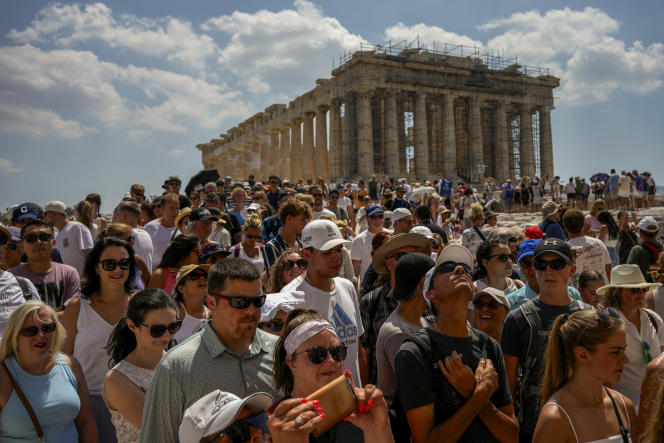This summer, under sometimes scorching temperatures in Athens, tourists wait almost an hour before being able to visit the Acropolis. The number of visitors has jumped 80% since 2019, according to the Greek culture ministry. In July, up to 23,000 people a day climbed the hill at the famous site, according to the Archaeological Resources Management Agency. At the beginning of August, the ministry therefore announced that visits will be regulated at Greece’s most famous site from September. A maximum of 20,000 people will be able to climb the hill daily. According to this pilot project, between 8 a.m. and 12 p.m., 8,000 people separated into four groups will be able to visit the site; then, between 12 p.m. and 8 p.m., up to 12,000 people divided into eight groups will be able to follow.
From Athens to the Greek islands, overtourism is becoming a headache for the Greek government, which is nevertheless delighted with the good health of a sector which represents 25% of the country’s gross domestic product and employs one in five workers.
The fires that hit the country at the end of July, and in particular the tourist island of Rhodes, whose images of the hotel disaster evacuations have been relayed around the world, have certainly frightened the sector, which hopes not to suffer a negative impact. in 2024, but everywhere in Greece, the inhabitants are increasingly rebelling against hypertourism. For the past few days, a “towel movement” has been mobilizing from the island of Paros to Crete to demand free access beaches, not privatized by bars or hotels with deckchairs and parasols.
On social networks, a photo of the beach of Vroskopos, on the Cycladic island of Kea, made the buzz. On the left of the image, the bay is desert, in July 2018, accessible only by a small dirt road. On the right, the landscape of October 2022 is quite different: 75 houses under construction fill the hill overlooking the beach; a luxury hotel complex is to be erected there. “This is what tourism development means for the natural landscapes of our country”, an indignant Greek on Twitter. While most are happy with the health of tourism, some are worried about the unbridled growth of the sector.
In Sifnos, the mayor asked the State to intervene to preserve his island. He proposes that measures be taken to prohibit the construction of swimming pools, while the Greek islands are often short of water, or even to authorize only the construction of houses respecting traditional architecture.
You have 63% of this article left to read. The following is for subscribers only.
